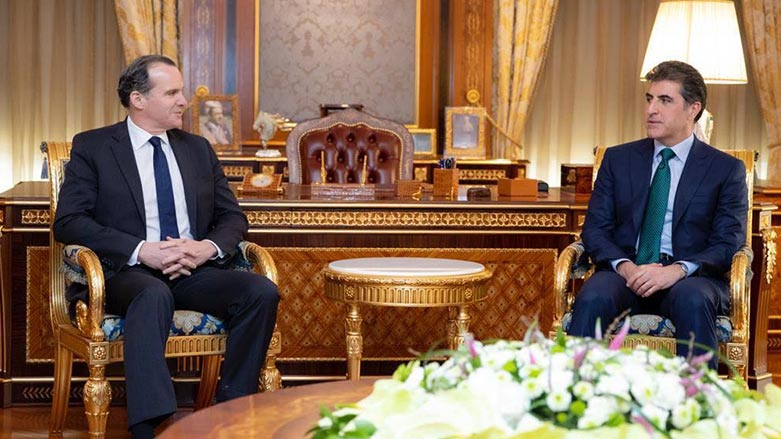US reassures KRG of continued commitment, after end of anti-ISIS combat operations

ERBIL (Kurdistan 24) – US National Security Council Coordinator (NSC) for the Middle East and North Africa, Brett McGurk, on Monday reiterated the United States' continues support for Iraq and the Kurdistan Region, stressing that Erbil and Baghdad can rely on Washington's partnership to confront and eliminate of ISIS.
McGurk visited Erbil, where he met on Monday with President Nechirvan Barzani. McGurk had come from Baghdad, where he had met Qasim al-Araji on Sunday.
Read More: Brett McGurk reassures Iraq of US commitment to strategic agreement
This is McGurk's first visit to Iraq and the Kurdistan Region since he became the top White House official dealing with the Middle East.
Visit Follows Announcement of End of US Combat Operations: No Change in US Commitment
A statement from the Office of the Presidency of the Kurdistan Region explained that President Nechirvan Barzani had received McGurk in Erbil. It described his visit to Iraq and the Kurdistan Region as significant in timing and "an important message amid shifting US-led combat mission in the country."
As Barzani's statement suggests, McGurk's visit follows the official Iraqi and US announcement of the end of US combat operations in Iraq, where it has been fighting ISIS for the past seven years—since 2014, when ISIS emerged out of the Syrian civil war to occupy one-third of the country of Iraq, threatening both Erbil and Baghdad.
The significance of the "timing of the visit" and its "important message," as highlighted by Barzani's office, deals with US reassurances that little is changing, as the mission of the US-led Coalition against ISIS, formally known as Combined Joint Task Force-Operation Inherent Resolve (CJTF-OIR), officially shifts from a combat mission to one of training, advising and assisting.
In fact, CJTF-OIR finished that transition last summer. As Michael Knights of The Washington Institute for Near East Policy earlier explained, Iraqi officials "have a timetable [by] the end of the year for the withdrawal of forces that don't exist." But, as Knights continued, "They want to have that kind of statement"—presumably to neutralize it as an election issue.
White House Affirms Ongoing Commitment to Iraqi, Kurdish Security
Following the conclusion of McGurk's meetings in the Kurdistan Region, NSC Spokesperson Emily Horne issued a statement explaining that McGurk's two-day visit to Iraq entailed meetings in Baghdad with Iraqi President Barham Salih, Prime Minister Mustafa al-Kadhimi, and former Speaker of the National Assembly, Mohammed al-Halbusi. "In Erbil," Horne said, McGurk met with President of the Iraqi Kurdistan Region Nechirvan Barzani and other senior leaders."
"Coalition forces remaining in Iraq will be present at the invitation of the Government with a mission limited to advising, assisting and enabling the Iraqi Security Forces to ensure ISIS can never resurge," she added.
Horne concluded with an important statement, as she stated that McGurk had "confirmed the United States' long-term commitment to Iraq under the Strategic Framework Agreement."
The Strategic Framework Agreement (SFA) was concluded in December 2008, in the last months of the George W. Bush administration. It lays out the provisions for ties between Iraq, following the overthrow of Saddam Hussein's regime five years earlier, and the US.
It envisages a broad relationship in the security, diplomatic, and economic fields—as the US has with other Middle Eastern allies.
In a note of historical irony, McGurk, along with the then-US ambassador to Iraq, Ryan Crocker, played a major role in crafting the SFA. Thus, thirteen years later—almost to the day—McGurk had the opportunity to reaffirm the US commitment to the agreement he, himself, helped to draft!
Other Issues
The meeting between Barzani and McGurk was also attended by the US Ambassador to Iraq, Matthew Tueller, and US Consul General in Erbil, Robert Palladino.
The statement from Barzani's office also described the other topics that they addressed: "the recent Iraqi elections and the results, the future of the political process in the country, multilateral talks among Iraqi factions and parties and ongoing efforts to build the new federal government in Baghdad were highlighted."
Both Barzani and McGurk shed light on "coordination and cooperation between the Peshmerga and the Iraqi army, Erbil-Baghdad relations, the Iraq-US strategic dialogue and ways to develop bilateral relations."
The two sides also agreed that "ISIS remains a genuine danger which necessitates the continued support of the international coalition to Iraq to confront and defeat the terrorist group."
"They also deemed the partnership and coordination among Iraqi parties and factions necessary to be able to form an inclusive government which responds to the grievances of the Iraqi citizens and preserves peace and stability."
The meeting concluded with discussions on "the internal developments in the Kurdistan Region, Iraq's relations with countries in the region and in the wider world, the regional developments, the situation in Syria and the Kurdish question in the country."
Editing by Laurie Mylroie and Khrush Najari
